复杂电价环境下基于强化学习的能源管理系统
IF 5
2区 工程技术
Q1 ENGINEERING, ELECTRICAL & ELECTRONIC
International Journal of Electrical Power & Energy Systems
Pub Date : 2025-09-24
DOI:10.1016/j.ijepes.2025.111038
引用次数: 0
摘要
分布式能源的日益集成化,使电力系统从传统的单向结构转变为双向互动网络。因此,由于储能系统的快速充放电能力,其在配电层面的部署正在加速。随着电价结构的日益复杂,在这种情况下优化储能系统的运行已成为能源管理系统面临的关键挑战。本文提出了一种两阶段电池管理系统,旨在最大限度地降低复杂电价结构环境下的运行成本。第一阶段,采用统计方法对短期电力需求进行预测,预测精度达到94.59%,优于深度学习技术,同时保持了小于1秒的快速预测和拟合时间。基于这些预测,采用最小-最大线性优化方法设置合适的阈值,有效降低峰值消耗。第二阶段,引入基于最接近策略优化算法的电池管理系统,作为一种实时运行技术,在考虑使用时间价格、基线惩罚和电池退化成本的情况下,持续实时调整充放电策略,使整体运行成本最小化。使用韩国实际功耗数据的仿真结果表明,与传统电池管理系统相比,该方法可将总体运行成本降低4.43%。结果验证了该框架在复杂电价结构下电池实时管理的实用性和有效性。本文章由计算机程序翻译,如有差异,请以英文原文为准。

Reinforcement learning-based energy management system in the complex electric tariff environment
The increasing integration of distributed energy resources has transformed power systems from traditional one-way structures into two-way interactive networks. In response, the deployment of energy storage systems at the distribution level is accelerating due to their rapid charge/discharge capabilities. As electricity tariff structures become increasingly complex, optimizing the operation of energy storage systems under such conditions has become a critical challenge for energy management systems. This paper proposes a two-stage battery management system designed to minimize operational costs in environments with complex tariff structure. In the first stage, short-term power demand is predicted by statistical approach, which achieves a prediction accuracy of 94.59%, outperforming deep learning techniques while maintaining a fast prediction and fitting time of less than one second. Based on these predictions, a Min–Max linear optimization method is applied to set an appropriate threshold, effectively reducing peak consumption. In the second stage, a battery management system based on the proximal policy optimization algorithm is introduced as a real-time operation technique, which continuously adjusts charging and discharging strategies in real-time to minimize overall operational costs with consideration of time-of-use price, baseline penalty, and battery degradation cost. Simulation results using real-world power consumption data from South Korea demonstrate that the proposed method reduces overall operational costs by 4.43% compared to conventional battery management system. The results validate the practicality and effectiveness of the proposed framework for real-time battery management under complex electricity tariff structures.
求助全文
通过发布文献求助,成功后即可免费获取论文全文。
去求助
来源期刊
CiteScore
12.10
自引率
17.30%
发文量
1022
审稿时长
51 days
期刊介绍:
The journal covers theoretical developments in electrical power and energy systems and their applications. The coverage embraces: generation and network planning; reliability; long and short term operation; expert systems; neural networks; object oriented systems; system control centres; database and information systems; stock and parameter estimation; system security and adequacy; network theory, modelling and computation; small and large system dynamics; dynamic model identification; on-line control including load and switching control; protection; distribution systems; energy economics; impact of non-conventional systems; and man-machine interfaces.
As well as original research papers, the journal publishes short contributions, book reviews and conference reports. All papers are peer-reviewed by at least two referees.

 求助内容:
求助内容: 应助结果提醒方式:
应助结果提醒方式:


